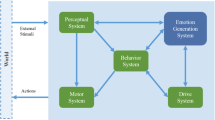Abstract
Autonomous Agents (AAs) capable of exhibiting emotional behaviors have contributed to the development of natural human-machine interactions in several application domains. In order to provide AAs with emotional mechanisms, their underlying architecture must implement an Artificial Emotion System (AES), a computational model that imitates specific facets of human emotions. Although several AES have been reported in related literature, their design is generally supported on several emotion theories, leading researchers to model and integrate isolated emotion components and mechanisms into the architectures of AES. This theoretical foundation of AES contributes to ambiguities in the analysis and comparison of their underlying architectures, which demands the definition of standards, design guidelines, and integrative frameworks. In this chapter, we present a psychologically inspired theoretical framework designed to serve as a platform for the unification of AES components, the comparison of AES, and the design and implementation of AES in AAs.
Access this chapter
Tax calculation will be finalised at checkout
Purchases are for personal use only
Similar content being viewed by others
References
Churamani N, Cruz F, Griffiths S, Barros P (2016) iCub: learning emotion expressions using human reward. In: International conference on intelligent robots and systems (IROS), workshop on bio-inspired social robot learning in home scenarios
Hudlicka E (2009) Affective game engines: motivation and requirements. In: Proceedings of the 4th international conference on foundations of digital games. ACM, pp 299–306
Bosse T, Duell R, Memon ZA, Treur J, van der Wal CN (2015) Agent-based modeling of emotion contagion in groups. Cogn Comput 7(1):111–136
Craig S, Graesser A, Sullins J, Gholson B (2004) Affect and learning: an exploratory look into the role of affect in learning with AutoTutor. J Educ Media 29(3):241–250
Marsella S, Gratch J, Petta P et al (2010) Computational models of emotion. Blueprint Affect Comput Sourcebook Manual 11(1):21–46
Gendron M, Barrett LF (2009) Reconstructing the past: a century of ideas about emotion in psychology. Emot Rev 1:316–339
Barrett LF, Bliss-Moreau E (2009) Affect as a psychological primitive. Exp Soc Psychol A 41:167–218
Damasio AR (1995) Descartes’ error: emotion reason, and the human brain. Putnam Berkley Group Inc., New York. Damasio AR (ed)
Acknowledgments
This work was supported by PFCE 2019.
Author information
Authors and Affiliations
Corresponding author
Editor information
Editors and Affiliations
Rights and permissions
Copyright information
© 2020 Springer Nature Switzerland AG
About this paper
Cite this paper
Rosales, JH., Rodríguez, LF., Ramos, F. (2020). Psychological Theoretical Framework: A First Step for the Design of Artificial Emotion Systems in Autonomous Agents. In: Samsonovich, A. (eds) Biologically Inspired Cognitive Architectures 2019. BICA 2019. Advances in Intelligent Systems and Computing, vol 948. Springer, Cham. https://doi.org/10.1007/978-3-030-25719-4_57
Download citation
DOI: https://doi.org/10.1007/978-3-030-25719-4_57
Published:
Publisher Name: Springer, Cham
Print ISBN: 978-3-030-25718-7
Online ISBN: 978-3-030-25719-4
eBook Packages: Intelligent Technologies and RoboticsIntelligent Technologies and Robotics (R0)




